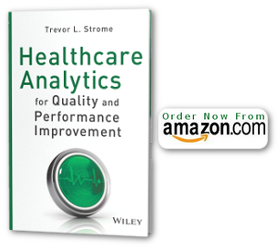Does business intelligence make ad-hoc reporting obsolete?
Despite what you might hear from the business intelligence (BI) vendor community, ad-hoc reporting and analysis is not dead – especially in the healthcare field.
In my current role, I am tasked with setting up a BI infrastructure to ensure that healthcare managers, directors, and other stakeholders have access to the organizational performance information they require when they need it. This is accomplished through building dashboards, reports, and other analytic applications. The overall goal is to ensure that the decision-makers have ready access to accurate and timely information necessary to run the organization.
Why are ad-hoc reports necessary?
As is to be expected, occasionally I get requests for data that go beyond what the dashboards, reports, and cubes are able to provide information for. Interestingly, however, I have found that requests for this “above and beyond” information have been increasing both in frequency as well as in sophistication. There are several reasons to which I attribute this increase in the number of sophisticated information requests from our healthcare professionals (including clinicians and administrators):
- Healthcare organizations (HCOs) are becoming increasingly computerized (i.e., via implementation of electronic medical records systems, supply chain management systems, etc); more data is available, and more people are aware of what is available.
- HCOs are becoming more evidence-based; decision-making and quality improvement initiatives now rely on data as opposed to gut-instinct and opinion
- More bona-fide research is being conducted based on data in computerized health records; this information needs to be accessed and extracted in a timely manner for researchers.
Rather than being a burden, I welcome these data requests as an opportunity to grow our business intelligence infrastructure. Each new request should be treated as a chance to evaluate potential new metrics to add a performance dashboard, to identify new measures to include in a cube, or at the very least, add to the development queue something that can be built into a parameterized report for re-use later on.
Ad-hoc requests help you understand the needs of the business
It is unrealistic to expect that dashboards, reports, and cubes will be able to handle the information needs of all users. After all, most deployed BI apps such as reports and dashboards were built based on requirements from several months ago (if not years!). In healthcare, the speed at which accurate, timely, and readily accessible data is embraced (in fact required!) continues to accelerate.
BI development within the HCO cannot remain stagnant. Ad-hoc data requests are an important indicator of what is currently important to the leadership, clinical staff, and researchers within a healthcare organization that may not be covered in existing dashboards or reports. Business Intelligence teams who learn from an organization’s ad-hoc requests help keep BI development driven by business need and enhance overall decision-making capability of the healthcare organization.


{ 1 comment… read it below or add one }
Pretty nice post. I just stumbled upon your blog and wanted to say that I have really enjoyed browsing your blog posts. In any case I’ll be subscribing to your feed and I hope you write again soon!
{ 1 trackback }